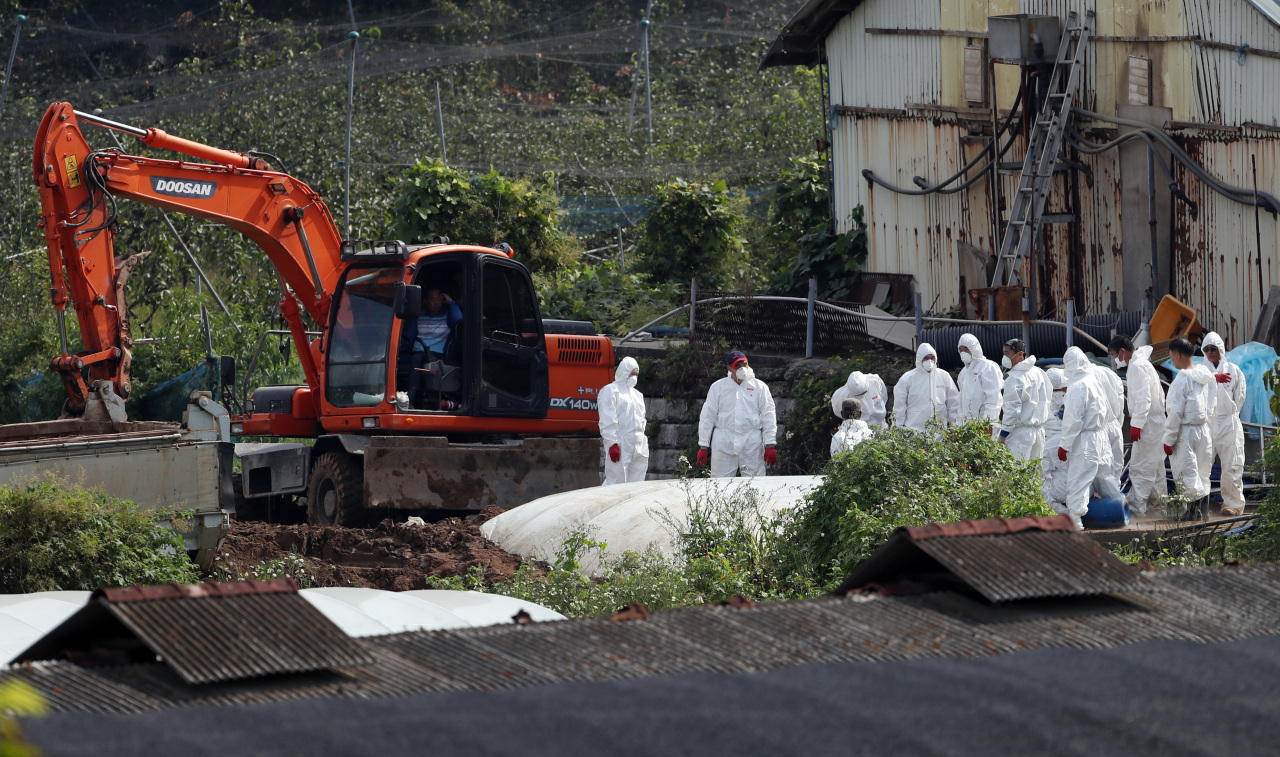Movement ban extended amid looming concerns over further spread of swine fever
By YonhapPublished : Sept. 26, 2019 - 11:14
South Korea's quarantine authorities on Thursday extended a movement ban on all pig farms, feed factories and other related facilities as multiple suspected cases of African swine fever raise concern over the nationwide spread of the deadly animal disease.
Since the first-ever ASF case in South Korea was confirmed on September 17, there have been six further confirmed instances of the highly contagious disease. Two other suspected cases were reported earlier in the day.
The agriculture ministry, which initiated a 48-hour standstill for all pig farms, feed factories and slaughterhouses across the country on Tuesday, said that the order will be extended for another two days.
The government also decided to ban all vehicles engaged in the livestock industry in northern Gyeonggi Province from traveling outside of the area.

South Korea culled more than 22,000 pigs as of Thursday morning, with more than 60,000 pigs set to be slaughtered in total, according to the ministry. The figure is set to increase further when more ASF cases are confirmed.
Quarantine authorities have been slaughtering pigs within a 3-km radius of the farms infected with the fever, larger than the required 500-meter radius.
All parts of Gyeonggi Province and Incheon, along with the neighboring Gangwon Province, have been designated as tightly controlled zones subject to tougher disinfection operations and checkups. They are banned from shipping pigs outside of the regions as well.
A new case was confirmed on Ganghwa Island, 60 kilometers northwest of Seoul on Thursday, according to the ministry. It is the seventh confirmed ASF case in the country in less than 10 days and the third on Ganghwa Island, which lies just south of North Korea.
A separate suspected case was also reported in Yangju, a town north of Seoul, along with another at a farm in nearby Yeoncheon.
Authorities are currently running tests on samples, with the results expected to come out later in the day.
All the cases of ASF have been detected in regions bordering North Korea, such as northern areas of Gyeonggi Province and Incheon.
Authorities have yet to determine what brought the virus into the country.
The virus first struck China in August 2018 and gradually spread to other Asian countries, including Mongolia, Vietnam and the Philippines. (Yonhap)








![[Graphic News] More Koreans say they plan long-distance trips this year](http://res.heraldm.com/phpwas/restmb_idxmake.php?idx=644&simg=/content/image/2024/04/17/20240417050828_0.gif&u=)
![[KH Explains] Hyundai's full hybrid edge to pay off amid slow transition to pure EVs](http://res.heraldm.com/phpwas/restmb_idxmake.php?idx=644&simg=/content/image/2024/04/18/20240418050645_0.jpg&u=20240419100350)






![[From the Scene] Monks, Buddhists hail return of remains of Buddhas](http://res.heraldm.com/phpwas/restmb_idxmake.php?idx=652&simg=/content/image/2024/04/19/20240419050617_0.jpg&u=20240419175937)

![[KH Explains] Hyundai's full hybrid edge to pay off amid slow transition to pure EVs](http://res.heraldm.com/phpwas/restmb_idxmake.php?idx=652&simg=/content/image/2024/04/18/20240418050645_0.jpg&u=20240419100350)

![[Today’s K-pop] Illit drops debut single remix](http://res.heraldm.com/phpwas/restmb_idxmake.php?idx=642&simg=/content/image/2024/04/19/20240419050612_0.jpg&u=)